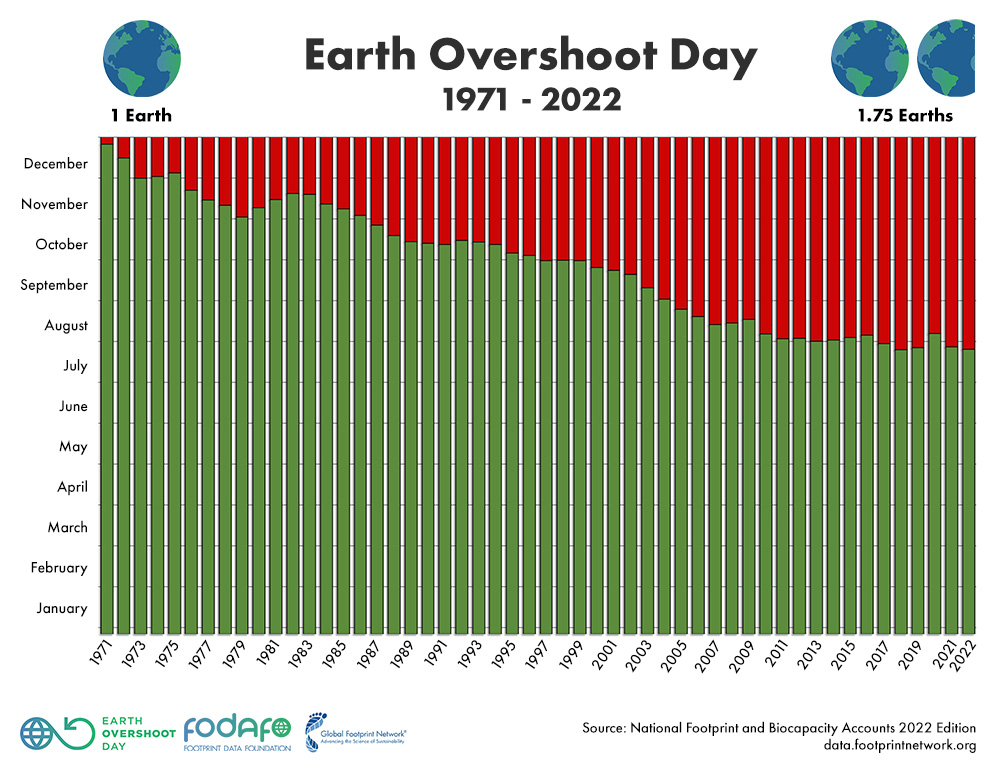

This year’s Earth Overshoot Day falls on July 28
The Power of Possibility web platform launches today to highlight many proven solutions to build resource security and combat climate change.
UNDER EMBARGO UNTIL 5TH JUNE, 2022, 3 a.m. CET
OAKLAND, CA — June 5th, 2022 — Earth Overshoot Day 2022 lands on July 28, earlier than last year. Over 50 years of global overshoot have led to a world where aggravated drought and food insecurity are compounded by unseasonably warm temperatures. As the date indicates, humanity continues to widen its annual ecological deficit two years after the pandemic-induced resource-use reductions exceptionally pushed the date back temporarily by 24 days.
“Between the pandemic, wilder weather patterns, and the resurgence or intensification of wars on several continents leading to massive food insecurity, the importance of fostering one’s resource security to support one’s economic prosperity is becoming ever more critical for cities, countries, and business entities,” said Global Footprint Network President Mathis Wackernagel.
Many effective and economically beneficial solutions already exist today to reverse ecological overshoot and support biological regeneration. Opportunities stem from all sectors: commercially available technologies or services, local government’s development strategies, national public policies, or best practices supported by civil society initiatives and academia. The Power of Possibility platform that launched today shows plenty of examples sorted by the five main pillars of intervention: healthy biosphere, energy, food, cities, and population.
For example, moving to smart grids and higher efficiency in our electric systems would #MoveTheDate 21 days. Reducing food waste by half would #MoveTheDate 13 days. Growing trees with other crops on the same land, also known as tree intercropping, would #MoveTheDate 2.1 days, among many others.
Each year, Earth Overshoot Day marks the date when humanity has used all the biological resources that Earth regenerates during the entire year. Humanity currently uses 75% more than what the planet’s ecosystems can regenerate—or “1.75 Earths.” From Earth Overshoot Day until the end of the year, humanity operates on ecological deficit spending. This deficit spending is currently the largest since the world entered into ecological overshoot in the early 1970s, according to the National Footprint & Biocapacity Accounts (NFA) based on UN datasets now produced by FoDaFo and York University.

Additional resources
Press release in multiple languages
How Earth Overshoot Day 2022 was calculated
How to compare the date of Earth Overshoot Day to previous years
Ecological Footprint data for more than 200 countries and regions
Infographics and videos available for media
BLOG: 50 years since Stockholm
About the Ecological Footprint
The Ecological Footprint is the most comprehensive biological resource accounting metric available. Based on 15,000 data points per country per year, it adds up all of people’s competing demands for biologically productive areas – food, timber, fibers, carbon sequestration, and accommodation of infrastructure. Currently, the carbon footprint, i.e., the carbon emissions from burning fossil fuel, make up 61 percent of humanity’s Ecological Footprint. The National Footprint and Biocapacity Accounts are now produced by FoDaFo with York University in Toronto.
About Global Footprint Network
Global Footprint Network is an international sustainability organization that is helping the world live within the Earth’s means and respond to climate change. Since 2003 we’ve engaged with more than 50 countries, 30 cities, and 70 global partners to deliver scientific insights that have driven high-impact policy and investment decisions. Together, we’re creating a future where all of us can thrive within the limits of our one planet. www.footprintnetwork.org
Media Contacts
Amanda Diep
+1 (510) 839-8879 x 304 (California, USA)
amanda.diep@footprintnetwork.org
Laetitia Mailhes
+33 650 979 012 (France)
laetitia.mailhes@footprintnetwork.org
